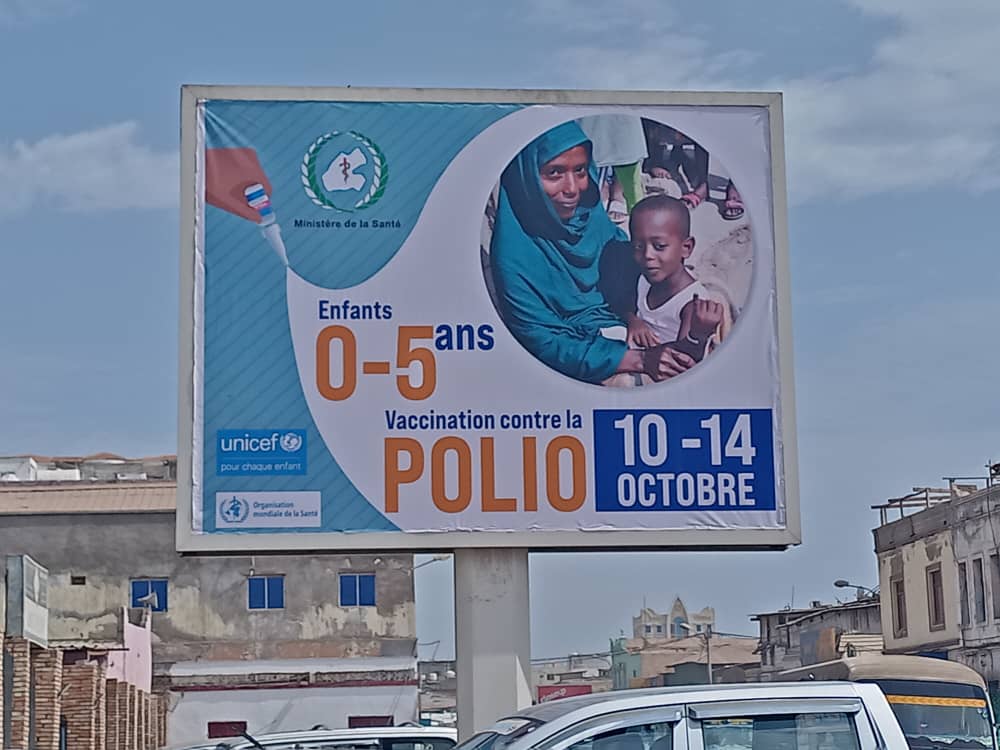
Djibouti, 12 October 2022 – The national polio vaccination campaign, initiated by the Government of Djibouti and carried out by the Ministry of Health, in collaboration with WHO and UNICEF, started on Monday 10 October 2022. It will run for five days, until Friday 14 October 2022.
More than 150 000 children under the age of 5 in Djibouti will receive an additional dose of the polio vaccine in this campaign, which follows 2 earlier vaccination rounds, in February and March 2022. The Ministry of Health, through this campaign, aims to protect all children throughout the country against poliovirus.
Djibouti was declared polio-free in 2002, but there are currently outbreaks of circulating variant polioviruses in the Horn of Africa, which increases the risk for all children in the Region.
This campaign, like the first 2 rounds, is a supplementary vaccination campaign offering children under 5 years of age an additional dose of oral polio vaccine to protect them from poliovirus, on top of their regular childhood vaccinations.
“It is our duty to protect Djibouti by ensuring that our children under 5 receive the polio vaccine whenever it is offered. I encourage all parents to make the vaccination of their children a priority – for them and for Djibouti,” said His Excellency the Minister of Health Dr Ahmed Robleh Abdilleh.
The World Health Organization (WHO) and the United Nations Children’s Fund (UNICEF) are supporting the campaign by providing novel oral polio vaccine type 2 (nOPV2), a next-generation polio vaccine. The 2 UN agencies also provide technical support to teams and staff working in the health system, including in disease surveillance.
“WHO provided technical support to the Ministry of Health for the planning and execution of this campaign. With the number and severity of polio outbreaks in the region on the rise, coupled with Djibouti’s geographic location and historical role as a crossroads, its children are increasingly vulnerable to polio. For this reason, it is essential that we vaccinate all children under age five, even if these children are up to date with their regular vaccinations,” said Dr Reinhilde Van De Weert, WHO Representative in Djibouti.
During this campaign, 378 vaccination teams will crisscross every neighbourhood for 5 days and go door-to-door in Djibouti’s towns and even the most remote localities to vaccinate every child.
“Despite the extraordinary progress that has been made in the polio eradication effort over the past 3 decades, new cases of polio are emerging around the world, and this is not acceptable. It is vital that we do everything we can to protect children, once and for all,” said Ms Beate Dastel, UNICEF Representative in Djibouti.
Poliovirus mainly affects children under the age of 5 and can lead to lifelong paralysis. It can easily be prevented by vaccination. Parents are urged to accept polio vaccines whenever offered.
The vaccination campaign in Djibouti is also supported by Gavi, the vaccine alliance, CDC (Centers for Disease Control) and AFENET (African Field Epidemiology Network). It is part of the global poliovirus eradication effort, led by the Global Polio Eradication Initiative (GPEI).


